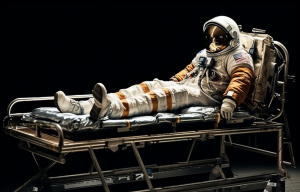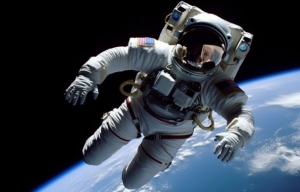 A heroic space explorer, and he’s being carried away in a stretcher. That actually happens on occasion. The possibility of space travel – albeit limited – is taken for granted. The reality, though, is that the number of hurdles that space-living presents is staggering. Sleep, for example, is no small undertaking. In the zero-gravity of space, horizontal and vertical are meaningless; you just float around. Astronauts literally have to strap themselves into bed to make sure they don’t bang into things while sleeping!
A heroic space explorer, and he’s being carried away in a stretcher. That actually happens on occasion. The possibility of space travel – albeit limited – is taken for granted. The reality, though, is that the number of hurdles that space-living presents is staggering. Sleep, for example, is no small undertaking. In the zero-gravity of space, horizontal and vertical are meaningless; you just float around. Astronauts literally have to strap themselves into bed to make sure they don’t bang into things while sleeping!
And if you think people floating while they sleep is an issue, think about what it means to make use of the facilities! Personal hygiene in space was once limited to sanitizing wipes until the introduction of the cylindrical shower-cell. When there is no up and no down, gray-matter refuses to “go down the drain”. With the advent of the cylindrical shower-cell, though, after the astronaut is finished, he can turn on the suction mechanism to pull the floating droplets of soap and water into a holding chamber.
Of the truly profound ill-effects of space-living, though, are loss of muscle mass, blood volume, and bone density. In the absence of needing to overcome gravity, muscles atrophy, blood-pressure increases in the head – thus causing the body to lower blood-volume by as much as 22% – and bones atrophy at a rate of about 1% per month. On that latter point, for comparison’s sake, consider that normal bone loss on Earth begins on average at age 50 and progresses at a rate of 1% per year!
Now, March 1st of the year 2016 was one of those significant days in the annals of space travel. Vaunted astronaut Scott Kelly – who tallied four space-flights and commanded three expeditions – returned from space for the final time and brought back with him a US record: an accumulated 382 days in space, 340 of which were consecutive – the latter often referred to as the year-long mission. That record has since been broken by Mark Vande Hei, but, at the time, it was a really big deal.
On May 25th of that same year of 2016 – almost three months since his much-celebrated return – Kelly was still grappling with some significant physiological effects of his year-long space-outing: sore feet, stiff legs, and fatigue. Believe it or not, that state of affairs marked a major improvement, considering that Kelly had expressed the sentiment that he deserved an Academy Award for acting OK when he first disembarked from the Soyuz spacecraft in Kazakhstan. He had been feeling so ill upon returning to his Houston home that, had he not just returned from space and thus not known why he was feeling that way, he would have headed straight for the emergency room!
Some of the side-effects of space travel are relatively easy to rebound from; others much harder. Research carried out by NASA shows that bone mass can take a number of years to recoup, and that bone density might never fully recover. In practical terms that can mean a higher risk of bone fractures when under strain, such as lifting heavy objects or experiencing a fall.
Now here’s an interesting point to ponder. Gravity is a force that pulls us down. Quite literally. And yet, it is precisely the ongoing process of
Throughout life, we experience a lot of resistance. Physical resistance, logistical resistance, emotional resistance. And the list goes on. It can be frustrating at times. Even very much so. Particularly given the proclivity of Western culture to equate fast and easy with good and beneficial. Contemporary society – with its vast array of dazzling devices and technological advances – exponentially exacerbates the challenge of seeing anything other than instant-gratification as being potentially pleasurable.
Space-travel has taught humanity so much about the universe and the world that we inhabit, in addition to moving mankind light-years forward in technological advancement. What it can and should also teach us, though, is that contending with
We seem to be inclined to think of l’fum tzaara agra (reward is commensurate with the effort expended) as being relevant to Olam HaBa. That is there that we’ll truly see the fruits of our strenuous labors; but that down here it’s no picnic. And that’s actually true. It is indeed not a picnic. But picnicking doesn’t exactly keep one in top shape either.
A common theme that we find in the teachings of the Sages is that the Torah-guided life that Hashem gives us is not only so that we should have it great in Olam HaBa, but also to provide us with the best of Olam HaZeh. “When you eat [from] the toil of your hands you are fortunate and it is good for you[1].” Ashrecha v’tov lach. The Sages explain the apparent redundancy. Ashrecha ba’Olam HaZeh, fortunate are you in this world, v’tov lach la’Olam HaBa, and it will be good for you in the world to come[2].
Ongoing struggle is what keeps us strong and fit – both physically and spiritually. The need to overcome resistance is what maintains the balance that is crucial for life’s optimal functioning. It’s what keeps us healthy. In body and in spirit. So the next time you encounter something that feels like it’s pulling you down, remember that, in reality, it’s actually there to hold you up.
[1] Tehillim 128:2
[2] Avos 4:1
